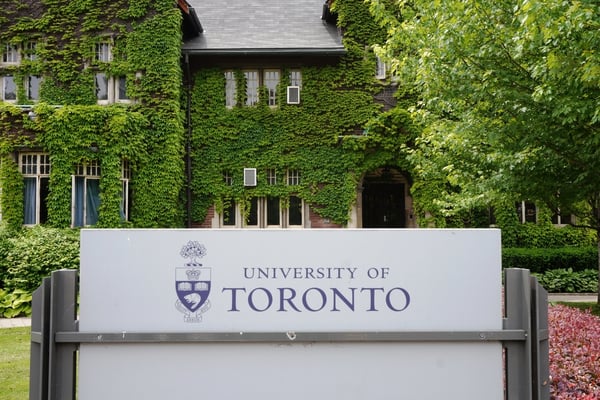Letter smearing Cotler relied on antisemitic stereotypes, was signed by dozens of academics.
By Dion J. Pierre, The Algemeiner
More than 300 Jewish faculty members at the University of Toronto (U of T) on Monday denounced a letter written by colleagues that “relied on antisemitic stereotypes” to accuse prominent human rights lawyer Irwin Cotler of inciting anti-Palestinian racism.
Cotler, who serves as Canada’s special envoy for Holocaust remembrance and antisemitism, spoke in January at an event hosted by the U of T Temerty Faculty of Medicine (TFOM) to commemorate Holocaust Remembrance Day.
After his address, 45 faculty members signed a letter to TFOM criticizing Cotler for urging the adoption of the International Holocaust Remembrance (IHRA) definition of antisemitism, arguing that it “reinforced anti-Palestinian racism in a way that is consistent with a broader pattern of silencing and erasure of Palestinian voices.”
The IHRA definition of antisemitism has been widely adopted internationally, including by the governments of Canada and Ontario, where U of T is located, as well as multiple universities and student governments.
The letter also described the Friends of Simon Wiesenthal Center for Holocaust Studies (FSWC), a Jewish human rights organization, as a racist “special interest group” that has “actively targeted colleagues of color.”
In a written response on Monday, 316 Jewish professors called the letter “an attack on Jewish faculty members and the Jewish community.”
“They portray Mr. Cotler’s defense of Jews as anti-Palestinian racism, thereby perpetuating an antisemitic tradition of accusing Jews who defend themselves as erasing the voices and suppressing the lives of others,” the signatories argued. “They represent this Holocaust Remembrance event as ‘reinforc[ing] anti-Palestinian racism,’ thereby trivializing and demeaning the torment and industrialized murder of Jews in the Holocaust.”
They continued, “Taken in its entirety, their letter is an example of the very antisemitism that Mr. Cotler dismantled in his presentation. Naturally, the other Faculty members don’t like being exposed. … Sadly, Jews have had to live with this kind of hostility for centuries.”
‘Jews are Being Told What is and isn’t Antisemitism’
FSWC head Michael Levitt called the accusations against Cotler “bizarre and disturbing” on Tuesday.
“Time and time again, it appears Jews are being told what is and isn’t antisemitism and what actions can and cannot be taken to combat this pervasive hatred,” he said.
“Clearly, the IHRA definition of antisemitism needs to be endorsed by U of T now more than ever, as Jew-hatred continues to fester on campus. We commend the hundreds of U of T faculty members who have chosen to raise their voices in the face of such ugliness,” he added.
The exchange of letters comes during what Canadian Jewish advocacy group B’nai Brith recently described as a “wide-ranging antisemitism crisis” within the University of Toronto system, where two student unions have twice passed resolutions endorsing the boycott, divestment, and sanctions (BDS) campaign targeting Israel in recent months, while university staff members last year made comments perceived as demonizing supporters of Israel and promoting antisemitic tropes.
TFOM spokesperson Gabrielle Giroday told The Algemeiner on Wednesday that “any kind of discrimination based on religion, race, ethnicity, ability, sexual orientation, gender identity, indigeneity, class, or other social identity — including Antisemitism, Islamophobia, or anti-Palestinian racism — is not tolerated in Temerty Medicine.”
“As benefits our commitment to academic freedom, we do not — and will not — censor or set preconditions upon what invited speakers may or may not say,” she continued. “We want to note that Temerty Medicine has taken numerous steps to facility respectful dialogue and support for our learners, faculty, and staff.”
Giroday also noted that TFOM has appointed senior advisors on antisemitism and Islamophobia, and last year hosted a session on religious discrimination in healthcare that included participants representing the Sikh, Christian, Hindu, Islamic, and Jewish faiths.
